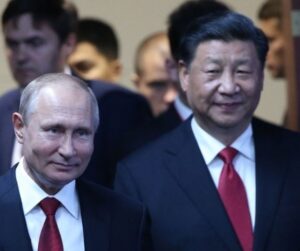During meetings in Moscow, President Xi Jinping of China and Russia’s President Vladimir Putin went to great lengths to impress the rest of the world with their “friendship without limits.” It was obvious Putin was sparing no expense to lavish ceremonial pomp on the guest from Beijing. There should have been little doubt in the mind of Xi that he was an important visitor to the Kremlin. Putin needs Xi’s support and backing on the world stage as, by any measure, Moscow’s strongman has made himself a pariah in the West and among many non-aligned nations. Of course, a $165 billion energy deal doesn’t hurt. How the payments will be made, however, may prove a problem for the US and the West.
“Chinese leader Xi Jinping and Russian President Vladimir Putin reaffirmed the deepening political and economic ties between their two countries at a summit that telegraphed their shared interest in challenging a world order led by the US and its democratic allies,” Ann M. Simmons and Austin Ramzy wrote in The Wall Street Journal. As expected, the Chinese peace plan offered up at the end of February for ending hostilities in Ukraine was an agenda item. However, the West has dismissed Beijing’s roadmap for halting the Ukraine conflict as not providing any substantive pathway to remove Russian forces from Ukraine and return lost Ukrainian territory, a prerequisite for the Kyiv government. Instead, most see the Chinese Communist Party (CCP) cease-fire initiative as an opportunity for Russia to regroup, rearm, and resume the conflict in a better tactical position to gain the advantage.
The economic package Russia and China signed up for has more significance for the two countries. Numerous deals were announced between the two nations. The Russian Prime Minister, Mikhail Mishustin, who also met with President Xi, said the two officials agreed to strengthen their comprehensive partnership. Strategic cooperation between Moscow and Beijing would entail increasing the Intergovernmental Russian-Chinese Commission on Investment Cooperation by 79 projects with a value exceeding $165 billion. Ben Aris, in Berlin, writing for BNE Intellinews, explained the details:
“Mishustin also highlighted the strategic energy partnership between Russia and China, emphasizing cooperation in high-tech areas, and the agro-industrial complex. He also highlighted cooperation on some of the key energy projects, including Yamal-LNG, Arctic LNG 2, the Amur Gas Chemical Plant and the Ust-Luga gas processing complex, as all being examples of successful joint energy projects.”

Vladimir Putin and Xi Jinping (Mikhail Svetlov/Getty Images)
In the aftermath of the significantly reduced demand from Europe, more gas exports to China have resulted. Two pipelines, the Power of Siberia 1 and 2, combined could supply the People’s Republic of China (PRC) with as much as 94 billion cubic meters of natural gas annually in five years once the second pipeline is complete. But more troubling is the agreement between Moscow and Beijing on using the yuan as a currency for payment. ”
We support the use of Chinese yuan in payments between Russia and countries of Asia, Africa, and Latin America,” Putin said. “[E]xpressing confidence that such ‘forms of payments will be developed between Russian partners and their colleagues in third countries,’” the Russian president continued, according to Aris. There are already reports of petroleum sold and goods purchased between the PRC and Middle East states using yuan as the form of exchange.
Regardless of whether the close bonds formed during this meeting last, a close relationship between the two most significant threats to the US and the West, even in the near term, portends a vexing diplomatic challenge for the Biden administration. China is determined to make its belt and road initiative successful, surrounding the world with economic and military strength, and Russia is determined to defeat the West’s support for Ukraine.
Additionally, “Beijing’s key message to the world is that the US is fanning the flames of war by supplying Ukraine with arms while China is a responsible, neutral power that hasn’t provided arms to either party because it stands for peace,” Michael Cunningham, a research fellow in The Heritage Foundation’s Asian Studies Center, told The Daily Signal, The Heritage Foundation’s news outlet. On its face, the CCP narrative viewed in the US and the West is ridiculous. But the US and the West are not the CCP’s target audience. It’s the underdeveloped and non-aligned countries Beijing hopes to persuade. Debunking the PRC story must be a priority for Biden’s foreign policy. If the close ties between Putin and Xi develop more fully, the capacity to double-team the US will be a problem. Economically and geopolitically, the world has gotten more complicated.
The views expressed are those of the author and not of any other affiliation.
Do you have an opinion about this article? We’d love to hear it! If you send your comments to [email protected], we might even publish your edited remarks in our new feature, LN Readers Speak Out. Remember to include the title of the article along with your name, city, and state.
Please respect our republishing guidelines. Republication permission does not equal site endorsement. Click here.

